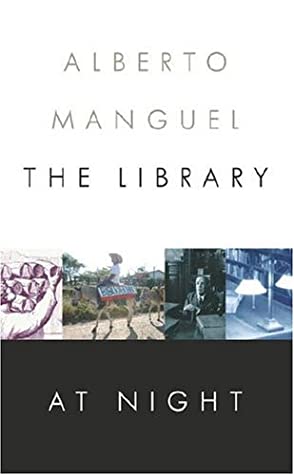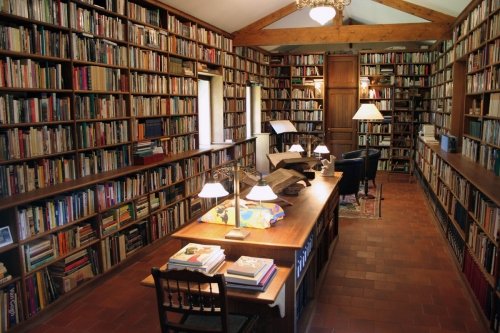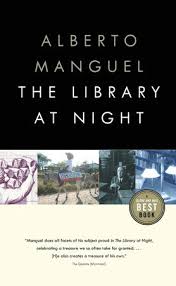The Library at Night (2006) by Alberto Mangual
GoodReads meta-data is 373 pages rated 3.99 by 3,333 litizens.
Genre: Bibliomania.
Verdict: Ruminative.
While converting a French barn into his private library Mangual thinks about libraries, books, and readers. Alberto Mangual, Argentine born, is a cosmopolitan writer, editor, translator, and — most of all — reader. How will he house his 35,000 books? What kind of shelving is best? Should the shelves be enclosed against dust and light? If so, can he afford that? Where will the readers go for e-books? How will the books be arrayed on the shelf? Each of these and many other practical questions sent him to the books for answers reaching back beyond the fabled library at Alexandria and forward past the internet.

By the way, Alberto, I recommend Henry Petroski, The Book on the Bookshelf (2010), mainly about bookshelves and shelving.
The chapter titles all have the same stem: The Library as ….
- Myth
- Order
- Space
- Power
- Shadow
- Chance
- Workshop
- Mind
- Island
- Survival, and finally
- Home
The insights are many and the prose is textured but supple. Savour a few passages with me.
- ‘The Alexandria Library that wanted to be the storehouse for the memory of the world was not able to secure the memory of itself.’ Now we know very little about it.
- A satire from the third century BC refers to the in habitants of that library at Alexandria in this way: ‘A horde of well-fed scribblers constantly squabbling among themselves in the cage.’ Universities it seems have a long history.
- ‘The ancient dead who rise from books to speak to us.’
- A book on papyrus has lasted longer than any book on a digital media. Indeed CDs decay after little more than a decade, despite the claims of manufacturers, even if one still has the device to play them.
- The universal library is the world itself.
- In the Koran we read that ‘one scholar is more powerful against the Devil than a thousand worshippers.’
- Every person’s library is autobiographical.
- In my mental library many books are reduced to a few remembered lines. By the way, his mental library also includes all the library books he has borrowed to read.
- We can imagine the books we’d like to read though they have not (yet) been written.
- Reading was once considered useful and important, then become at times dangerous and subversive, and now is condescendingly accepted as a pastime for others [by those who do not have time to read]. (Corollary: No one has the time to do something they regard as unimportant, and everyone has the time to do the things they think are important.)
- He might have added this thought from me: there is no book so dreadful that some idiot on GoodReads scores it a 4+ and praises it.

It is all trip and no arrival, though there is a subsequent, similar book by Mangual called Packing My Library (2018) when it came time to move that carefully wrought Barn Library. It is much shorter and perhaps I will continue with it.

He does say something about organising the books by language which is overridden by content in some cases, e.g., all the krimis are together. But he does not discuss the systems libraries use from Dewey on, nor does he mention the software now available for private libraries such as I use – Book Collector. Zip on cataloguing or shelving, yet these are the gears of most libraries.

